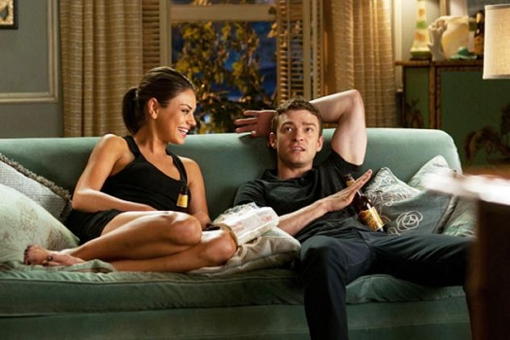By Pam Glazier · July 24, 2011

I love Justin Timberlake. He’s puckish. He’s fun. I’ve seen him in many roles where he adds depth to bit parts which end up making the films he is in more enjoyable. Mila Kunis can be fun too. She’s not my favorite, but I can’t deny that she has a certain charm. And when you put both of these fun people together in a light-hearted romantic comedy setting, you inexplicably get some of the most unbelievably wooden performances in the history of protoplasm.
I know what you’re going to say. Yes, rom-coms are formulaic, the woodenness is inherent. But that is simply not true. Sure there’s a rigid structure to rom-coms, but as one who is familiar with the genre, I can attest to the fact that there is still room within all that structure for there to be charming performances that send the audience reeling happily into a blissful “what-if” land. Of course, the excellence of the writing, and the acting, and the chemistry are vital to this occurring. Sadly, there was none of that in this film.
We begin with Dylan (Justin Timberlake) in Los Angeles and Jamie (Mila Kunis) in New York. Both get dumped by their respective boy/girlfriends for being emotionally unavailable. Then, as luck would have it, Jamie just happens to be the one meeting Dylan at the airport in order to take him to the offices of GQ. The complexity of plotting involved in getting these two together really tramples all over their meet-cute where Jamie is the free spirited silly girl who jumps onto the baggage claim after a paper she had dropped and Dylan is the regular guy caught off guard by her zany charm. We don’t really end up caring because we’re just trying to follow the story line at this point. She is a headhunter who has been scouting him for a dream-job position, and yet he is somehow reticent. He says he’s just exploring his options, and Jamie has to go all out (in a weird “not-a-first-date” first-date kind of way) to “sell” him on New York. He agrees, moves to New York, and he and Jamie become best friends. My initial response to all of this was, “What the hell? Why do I care? I thought this movie was called Friends with Benefits. What’s up with it taking 30 minutes to get to the sex?” But I should have been grateful it took so long because the sex scenes were not inspiring. They weren’t sexy, but they also weren’t emotionally fulfilling—just crappy banter covered in sheets.
But there were some fleeting moments of goodness in this film. Woody Harrelson plays Tommy, the GQ sports editor who is extremely sporty, extremely in your face, and extremely openly gay. Overall, Harrelson’s character was great, and I was sad that I wasn’t watching a movie about him. And of course, Richard Jenkins was amazing (as he always is), but the role he was playing wasn’t good enough for him, and he couldn’t salvage it completely even though he is: The Jenkins.
It seems like this movie had interesting ideas, but all of those ideas were in the periphery of the bland, done-before idea of “platonic gets complicated.” Mila Kunis’ portrayal of Jamie (a sort of quintessential New Yorker perhaps) was good, but just like the other fleeting moments of good, it simply wasn’t enough to sustain this film—and again, the chemistry just wasn’t there.
There are a lot of ways one could approach changing this film. Obviously, the chemistry could’ve been better, but let’s focus on the writing. Because the film is trying to do too many things at once, it just ends up doing all of them blandly in order to make the plotting work (hence the sadly trampled meet-cute mentioned earlier). This thing could have used a re-write or three before going into production. In those re-writes the fat could have been trimmed (i.e., the unnecessary introductory breakups, the bafflingly boring multiple flash-mob scenes, and Jamie’s random mini-romance with the pediatric oncologist). This trimming of the fat would have allowed space for the smaller, more interesting characters that really brought depth to this thing to be coaxed out into bigger roles that would then enhance the roles of the romantic leads. This would have made us all into satiated happy sappy dorks—which is the only way one should be after a truly good rom-com.